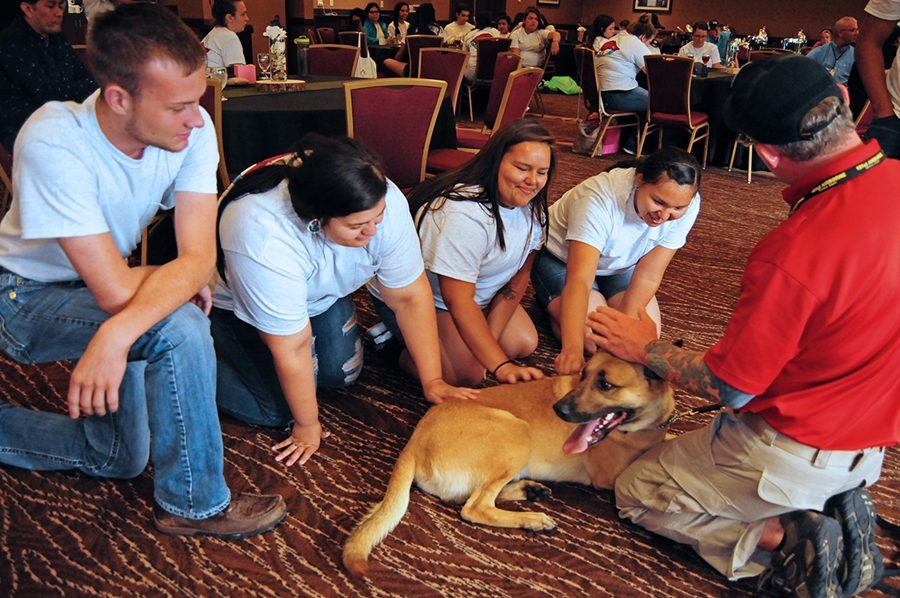
FAYETTEVILLE, Ark. – The 2018 Native Youth in Food and Agriculture Leadership Summit recently hosted Native American and Native Hawaiian youth at the annual event held June 7-14 at the University of Arkansas School of Law. The summit was organized by the Indigenous Food and Agriculture Initiative at the School of Law.
“Across Indian Country, tribes are investing deeply in food and agriculture production, both for economic development and for the health and well-being of their people and communities,” said Janie Simms Hipp, director for the Indigenous Food and Agriculture Initiative. “It is critical that our young people understand the role of tribal governance and sovereignty in regaining our futures around food. This more intensive summit allows them to engage with each other and their course material in a deeper, more meaningful way.”
The summit provided an intensive, skills-focused curriculum that allowed attendees the opportunity to explore a particular area of food and agricultural production or policy in Indian Country. The four subject areas were agricultural business and finance; conservation practices and planning for agricultural production; agricultural law and policy; and nutrition and health.
Within these curriculum tracks, students learned from industry leaders and experts about critical agricultural practices that will support them in their own farming and ranching endeavors and prepare them to assist with long-term agricultural planning and production at a tribal government level.
Curriculum included the development of an Agricultural Resources Management Plan pursuant to the American Indian Agricultural Resources Management Act, principles of agricultural law policy, the importance of traditional foods and nutrition, natural resource conservation, agribusiness marketing, and the role of finance and credit in agricultural operations. In addition to these specialized courses, the students all participated in several general courses, including an incisive look at tribal governance with then-Dean Stacy Leeds and a full grower training for the Food Safety Modernization Act Produce Safety Rule.
“We developed and designed the curriculum for the four summit tracks this year based on the self-identified needs of our student audience as well as our faculty leads’ expertise in this space,” said Erin Shirl, research director for the Indigenous Food and Agriculture Initiative and summit organizer. “The tracks were designed to incorporate all the business planning and agricultural risk management education we have done with this audience over the past five years and then really take that to the next level, so our students could see not only how those skills support the success of their individual operations, but also how they support success in food and agriculture at a tribal level.”
Students also participated in a field trip to the Quapaw Tribe of Oklahoma to tour their food operations and learn about agriculture in a tribal setting. The tour included visits to the Quapaw meat processing plant and feeding facility, coffee roasting facility, greenhouses and beekeeping operation, and dog training program.
The summit was made possible through generous support from the national Farm Credit Council. Additional funding was provided by the United States Department of Agriculture’s Beginning Farmer and Rancher Development Program; USDA Natural Resources Conservation Service; NoVo Foundation and other foundations supporting the work of the Indigenous Food and Agriculture Initiative.
About the Indigenous Food and Agriculture Initiative: The initiative enhances health and wellness in tribal communities by advancing healthy food systems, diversified economic development and cultural food traditions in Indian Country. The initiative empowers tribal governments, farmers, ranchers and food businesses by providing strategic planning and technical assistance; by creating new academic and professional education programs in food systems and agriculture; and by increasing student enrollment in land grant universities in food and agricultural related disciplines.
About University of Arkansas School of Law: The University of Arkansas School of Law prepares students for success through a challenging curriculum taught by nationally recognized faculty, unique service opportunities and a close-knit community that puts students first. With alumni in all 50 states, the District of Columbia, two territories and more than 20 countries, it has been ranked among the top 10 "Values in Legal Education" by the National Jurist magazine for five consecutive years and is among the top 42 public law schools, according to U.S. News and World Report.
About the University of Arkansas: The University of Arkansas provides an internationally competitive education for undergraduate and graduate students in more than 200 academic programs. The university contributes new knowledge, economic development, basic and applied research, and creative activity while also providing service to academic and professional disciplines. The Carnegie Foundation classifies the University of Arkansas among only 2 percent of universities in America that have the highest level of research activity. U.S. News & World Report ranks the University of Arkansas among its top American public research universities. Founded in 1871, the University of Arkansas comprises 10 colleges and schools and maintains a low student-to-faculty ratio that promotes personal attention and close mentoring.
Contacts
Bryan Pollard, Communications Director
Indigenous Food and Agriculture Initiative
479-575-3765,
Erin Shirl, Research Director
Indigenous Food and Agriculture Initiative
479-575-6572,